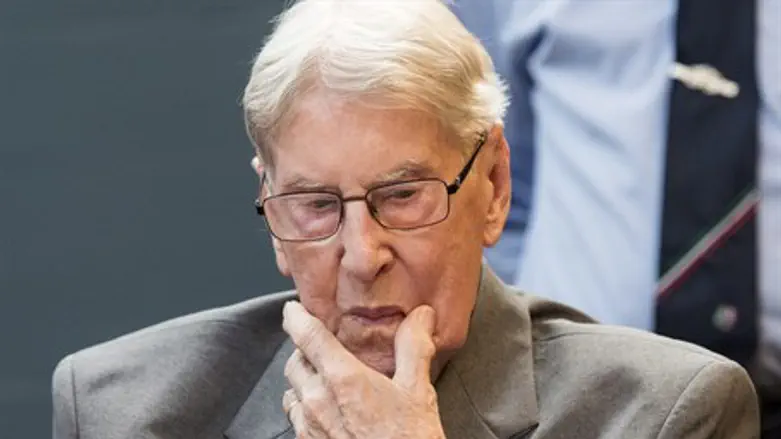
(AFP) A former SS guard was on Friday convicted by a German court for complicity in the mass murders at Auschwitz death camp, capping what is likely one of the last Holocaust trials.
More than 70 years after World War II, Reinhold Hanning, 94, was sentenced to five years' imprisonment over his role at the Nazi-run camp in occupied Poland.
"The accused is sentenced to five years' jail for accessory to murder in 170,000 cases," ruled the court in the western German city of Detmold.
"He was aware that in Auschwitz, innocent people were murdered everyday in gas chambers."
During the four-month trial, which involved witnesses giving harrowing accounts of the living hell they faced, prosecutors outlined how Hanning had watched over the selection of prisoners deemed fit for slave labor, and those sent to the gas chambers.
They also accused him of knowing about the regular mass shootings and the systematic starvation of prisoners.
For Holocaust survivors and inmates' descendants, the trial marked "a big, even though a late, step towards a just examination of the mass murders in Auschwitz."
This is because it for the first time focused on "the division of labor in the collective mass murders at Auschwitz," the plaintiffs said in a joint statement.
Unlike previous trials of officers who personally sent people to the gas chambers, this case covered the broader organization of the extermination camp, where inmates were also starved to death or killed in summary executions.
The verdict was welcomed by World Jewish Congress President Ronald S. Lauder.
"Mr. Hanning got a fair trial, and today's verdict is very clear: He was complicit in mass murder. He was part of a merciless killing machine. Without the active participation of people like him, Auschwitz would not have been possible."
'I am ashamed'
Prosecutors had sought six years in prison on grounds that Hanning "contributed to the extermination aim of the camp", while his lawyers wanted an acquittal, saying he had not personally "killed, hit or abused" anyone.
In April, Hanning himself broke his silence, speaking for the first time about his time at Auschwitz in court.
Telling victims "I am sorry," he admitted to the court that he knew prisoners were being shot and gassed and that their bodies were burned at the camp.
He said he had been "silent all my life" about the atrocities because he felt deep shame, and had never spoken a word about it to his wife, children or grandchildren.
"No one in my family knew that I worked at Auschwitz. I simply could not talk about it. I was ashamed," said the white-haired, bespectacled widower, who ran a dairy after the war.
"I deeply regret having listened to a criminal organization that is responsible for the deaths of many innocent people, for the destruction of countless families, for the misery, distress and suffering on the part of victims and their relatives.
"I am ashamed that I let this injustice happen and did nothing to prevent it," he told the court.
Cog in the Nazi machine
More than one million European Jews were killed at Auschwitz. Yet, of the camp's 6,500 SS personnel who survived the war, fewer than 50 were ever convicted.
Hanning's trial follows a high-profile case last year against Oskar Groening, dubbed the "Bookkeeper of Auschwitz."
Groening was sentenced in July to four years in prison, even though he had previously been cleared by German authorities after lengthy criminal probes dating back to the 1970s.
But the legal basis for prosecuting former Nazis changed in 2011 with Germany's landmark conviction of former death camp guard John Demjanjuk.
He was sentenced not for atrocities he was known to have committed, but on the basis that he served at the Sobibor camp in occupied Poland - for having been a cog in the Nazis' killing machine.
Another case currently being heard by a German court is that of former SS medic Hubert Zafke, 95, who is charged with at least 3,681 counts of complicity in murder.
Hearings have however been repeatedly postponed owing to the poor health of the defendant, raising questions on whether it can go ahead.